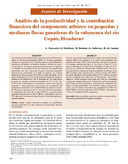| dc.contributor.author | Chavarría, A. | |
| dc.contributor.author | Detlefsen Rivera, Guillermo | |
| dc.contributor.author | Ibrahim, Muhammad Akbar | |
| dc.contributor.author | Galloway, Glenn | |
| dc.contributor.author | Camino Velozo, Ronnie de | |
| dc.date.accessioned | 2015-05-20T17:20:35Z | |
| dc.date.available | 2015-05-20T17:20:35Z | |
| dc.date.issued | 2011 | |
| dc.identifier.issn | 1022-7482 | es_ES |
| dc.identifier.uri | https://repositorio.catie.ac.cr/handle/11554/7026 | |
| dc.description.abstract | Se evaluó la productividad actual y potencial de los árboles maderables de sistemas silvopastoriles (SSP) en 35 fincas ganaderas (medianas y pequeñas), de la subcuenca del río Copán, Honduras, mediante un inventario de brinzales, latizales y fustales. Se encontró un total de 72 especies arbóreas pertenecientes a 62 géneros y 35 familias, de las cuales el 29% (21 especies), son consideradas maderables con valor comercial. El mayor potencial maderable comercial fue encontrado en el SSP de pasturas con árboles dispersos de Pinus oocarpa. Este SSP es el más abundante en las fincas estudiadas (77%), con una densidad promedio de latizales y fustales de 156 árboles ha-1 y de 43 brinzales ha-1. De igual forma, presenta un volumen comercial promedio de 71,5 m3 ha-1. De las 35 fincas inventariadas se seleccionaron ocho al azar (cuatro pequeñas y cuatro medianas), para conocer la contribución del componente maderable en la rentabilidad de las mismas. Los análisis financieros mostraron que en el caso de las fincas medianas, la contribución del VAN fue de 384,8 USD ha-1 y para las fincas pequeñas el aporte fue de 269,7 USD ha-1, equivalente a un 27 y 70% adicional a los ingresos obtenidos por la actividad ganadera, respectivamente. | es_ES |
| dc.description.abstract | Current and potential productivity of timber from silvopastoral systems (SPS) was evaluated in 35 cattle farms (medium and small) of the basin of Rio Copan, Honduras, through an inventory of seedlings, saplings and taper. It was found a total of 72 tree species belonging to 62 genera and 35 families, of which 29% (21 species) are considered commercially valuable timber. The greatest
potential for commercial timber production was found in the SPS of pasture with scattered trees of Pinus oocarpa. This SPS is the most abundant in the farms studied (77%), with an average density of saplings and adult trees of 156 trees ha-1 and 43 seedlings ha-1. It also Possesses on average of 71.5 m3 ha-1 of standing
commercial volume. Eight of the 35 farms were selected randomly (four small and four medium), to determine the contribution of timber to farm profitability. The financial analysis showed that in the case of medium sized farms, the contribution to NPV was 384.8 USD ha-1 and for small farms 269.7 USD ha-1, equivalent to 27 and 70% additional NPV, respectively. | en_EN |
| dc.format.mimetype | pdf | |
| dc.language.iso | es | es_ES |
| dc.publisher | CATIE, Turrialba (Costa Rica) | es_ES |
| dc.relation.ispartof | Agroforestería en las Américas, número 48 (2011) | |
| dc.rights.uri | https://creativecommons.org/licenses/by-nc-nd/4.0/ | |
| dc.subject | PINUS OOCARPA | es_ES |
| dc.subject | ARBOLES FORESTALES | es_ES |
| dc.subject | SISTEMAS SILVOPASCICOLAS | es_ES |
| dc.subject | EXPLOTACIONES GANADERAS | es_ES |
| dc.subject | ESPECIES | es_ES |
| dc.subject | ARBOLES DISPERSOS | es_ES |
| dc.subject | INVENTARIOS FORESTALES | es_ES |
| dc.subject | VALOR ECONOMICO | es_ES |
| dc.subject | ANALISIS ECONOMICO | es_ES |
| dc.subject | PRODUCTIVIDAD | es_ES |
| dc.subject | CUENCAS HIDROGRAFICAS | es_ES |
| dc.subject | RIO COPAN | es_ES |
| dc.subject | HONDURAS | es_ES |
| dc.title | Análisis de la productividad y la contribución financiera del componente arbóreo en pequeñas y medianas fincas ganaderas de la subcuenca del río Copán, Honduras | es_ES |
| dc.type | Artículo | es_ES |
| dc.identifier.publisher | CATIE | es_ES |
| dc.identifier.publication | CATIE | es_ES |
| dc.journal.issueNumber | 48 | |
| dc.journal.pages | 146-156 | |



